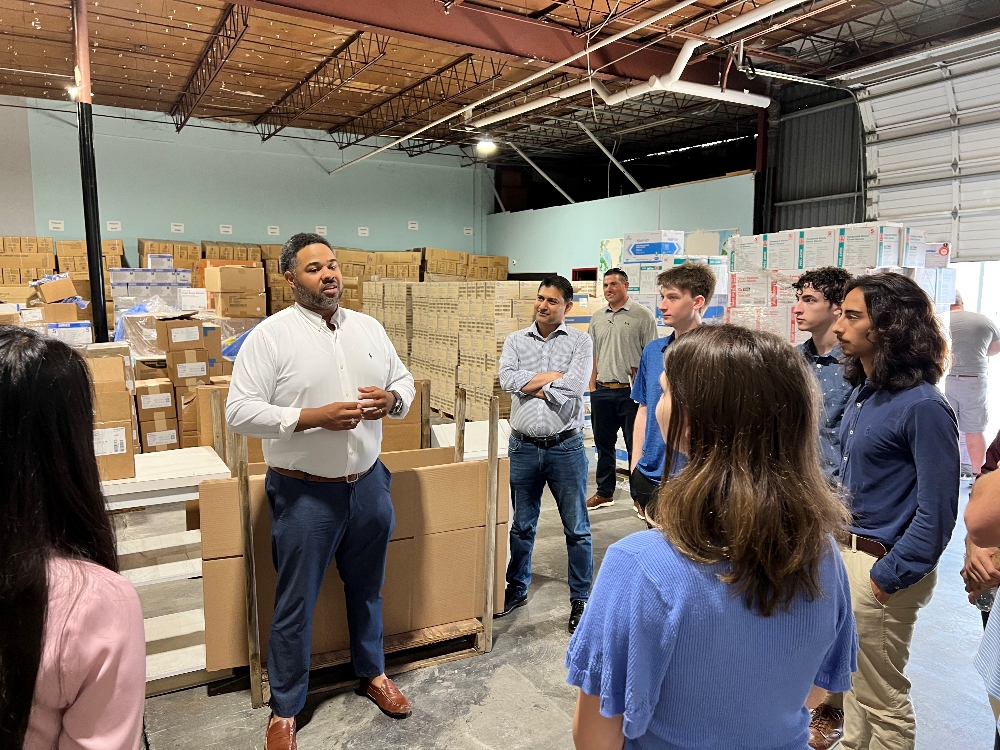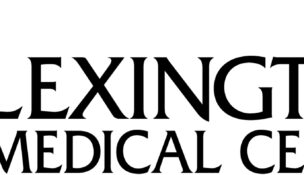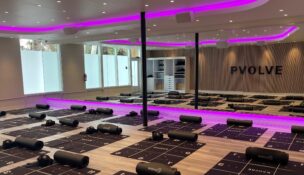How a Columbia company tackles challenges in the medical supply chain
Contributing Writer //September 12, 2023//
How a Columbia company tackles challenges in the medical supply chain
Contributing Writer //September 12, 2023//
By Christina Lee Knauss
Boxes of crutches that line one wall of the warehouse at Columbia’s Rhino Medical Supply are a testament to the challenges of the health care supply chain.
Officials at Rhino brought in as many crutches as they could when they learned that a shortage of them was caused by a global aluminum shortage in 2022 that caused wait times of up to four months for crutches at some health care providers.
They were able to get crutches to some customers who needed them, but just as quickly as the global shortage emerged, it waned, leaving the supplier with a large supply of them, but no huge demand.
That’s just one of the everyday challenges facing Rhino’s CEO Lance Brown and his coworkers, who have learned since the company’s beginning in 2020 that the health care supply chain faces the same problems as that of every other industry on the market.
The only difference being, of course, that many health care products are needed in life and death situations in hospitals, and to maintain the everyday health of millions of other patients around the country.
A supply chain glitch that delays a shipment of sneakers might be annoying, for instance, but doesn’t endanger a customer’s life. Not being able to get insulin or asthma medication in a timely manner, however, can be a threat to life.
That’s why Brown and the other workers at Rhino are doing whatever they can to streamline the supply chain for their customers and, when possible, keep as much of the process right here in the United States. And, as they have since launching in 2020, they keep an eye out for small- and medium-sized clients who might get lost in the shuffle.
 “One thing that we constantly deal with is that when there is a disruption with one manufacturer in the supply chain, that eventually leads to another,” said Charles Vartanian, chief administrative officer for Rhino Medical Supply. “During the pandemic and now, we find that when there are disruptions that cause stress points in the chain, most large distributors and health care systems are able to get allotments, but it’s often the smaller health care systems and clients like individual doctors’ offices and practices that get left behind.”
“One thing that we constantly deal with is that when there is a disruption with one manufacturer in the supply chain, that eventually leads to another,” said Charles Vartanian, chief administrative officer for Rhino Medical Supply. “During the pandemic and now, we find that when there are disruptions that cause stress points in the chain, most large distributors and health care systems are able to get allotments, but it’s often the smaller health care systems and clients like individual doctors’ offices and practices that get left behind.”
Resiliency and catering to those smaller customers has been a big focus at the company since its launch in 2020.
Brown, who had spent years working with Wells Fargo, started Rhino Medical out of his garage during the height of COVID-19 because he saw the need nationwide for personal protective equipment (PPE). He and his partners made an effort to acquire PPE from U.S.-based suppliers when possible and within eight months of the launch had shipped orders of masks, hospital gowns and other equipment to 30 states. Over the course of the pandemic, they shipped millions of masks nationwide and also donated masks and other supplies to small health care providers and schools in South Carolina and other states.
As demand grew, the company expanded into office and warehouse space off Rosewood Drive in Columbia. Brown and his partners also grew the company’s list of products to include a wide range of health care items, not just those in demand because of the pandemic.
The World Health Organization officially declared an end to COVID-19 as a global emergency in May. Rhino Medical Supply is taking the lessons they learned from it and using them to continue to grow the company and work in new ways.
Brown, however, sees that some hospitals and other large clients have gone back to pre-pandemic practices that eventually could cause them problems.
“During the pandemic, a lot of providers did a good job of diversifying their sources for supplies — they reached out to alternative manufacturers and alternative suppliers, smaller companies like Rhino,” Brown said “Now many of them are going back to rely solely on larger manufacturers and distributors, and the next time one of those faces a shutdown or a supply chain crunch, they’re going to deal with the same shortages they dealt with during the pandemic.”
One challenge that Rhino faces in dealing with larger hospital systems is the fact that many of them are locked into what are called group purchasing orders, or GPOs, with large medical suppliers around the country. Through those deals, hospitals are given lower prices on bulk orders of items they use a lot of, like masks and syringes, but they must order a certain amount and deal exclusively with the company providing the GPO.
One way that Rhino has stepped up their game to become more attractive to a wider range of clients is forming their own brand – Ceros. Through Ceros, they first distributed only FDA-approved syringes, but have since diversified to other products.
Rhino is also working to promote products by smaller U.S.-based companies that can help to fill high-volume needs. The company is currently working to get hospitals to test and eventually adopt use of high-quality N95 masks made by a company called Lighthouse.
One of Brown’s biggest goals is to get more health care clients to look toward manufacturers and locally based suppliers for the products they need in order to head off future nightmares with overseas shipping delays that caused so many problems during the height of the pandemic.
“We need more hospital systems and other clients to be more intentional about supporting U.S. -based suppliers,” he said.
Brown and others at Rhino are also looking at ways to make the business more sustainable in the next few years, including the possibility of working with companies who make medical supplies that are easier to recycle. Sustainability is more difficult in the medical world, however, because of sanitation requirements.
“Everything is a one-time use basis in the health care system so obviously you go through a lot of disposable items, and they can’t go into normal recycling,” Vartanian said.
As Rhino looks to expand its Ceros brand and the variety of products it distributes, Brown said they are determined not to forget about the smaller customers that the company has served since its beginning. He remembers the days when individual customers were coming to the Rosewood Drive office to purchase COVID-19 home tests when there was a shortage. And Brown and other workers from Rhino will still regularly jump into the company’s van to deliver orders to small doctor’s offices and other clients around the state.
“Our passion is to help people in South Carolina — local hospitals and local customers,” he said. “That way we’re doing business and keeping the money here at home.”
l















